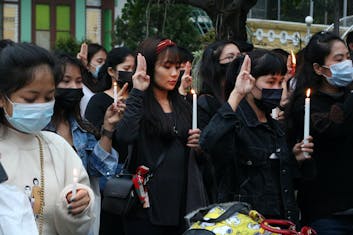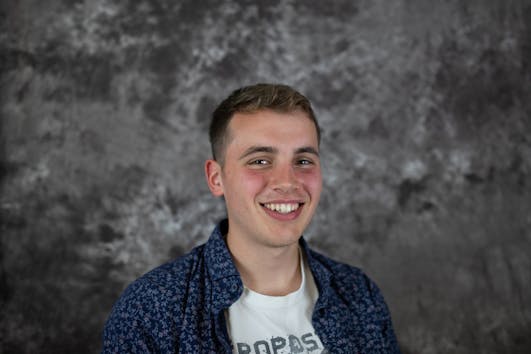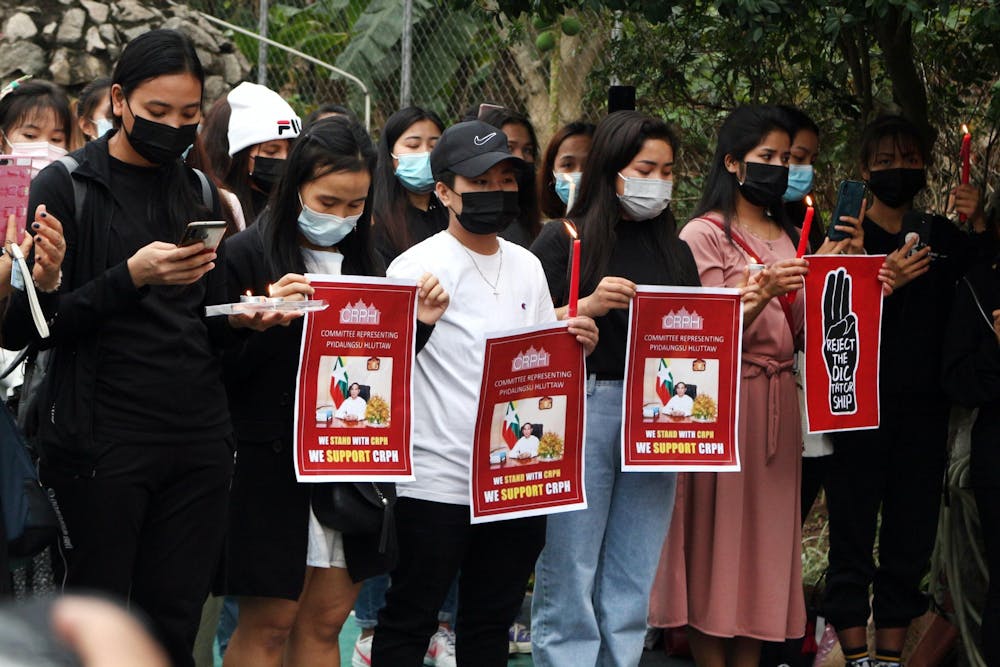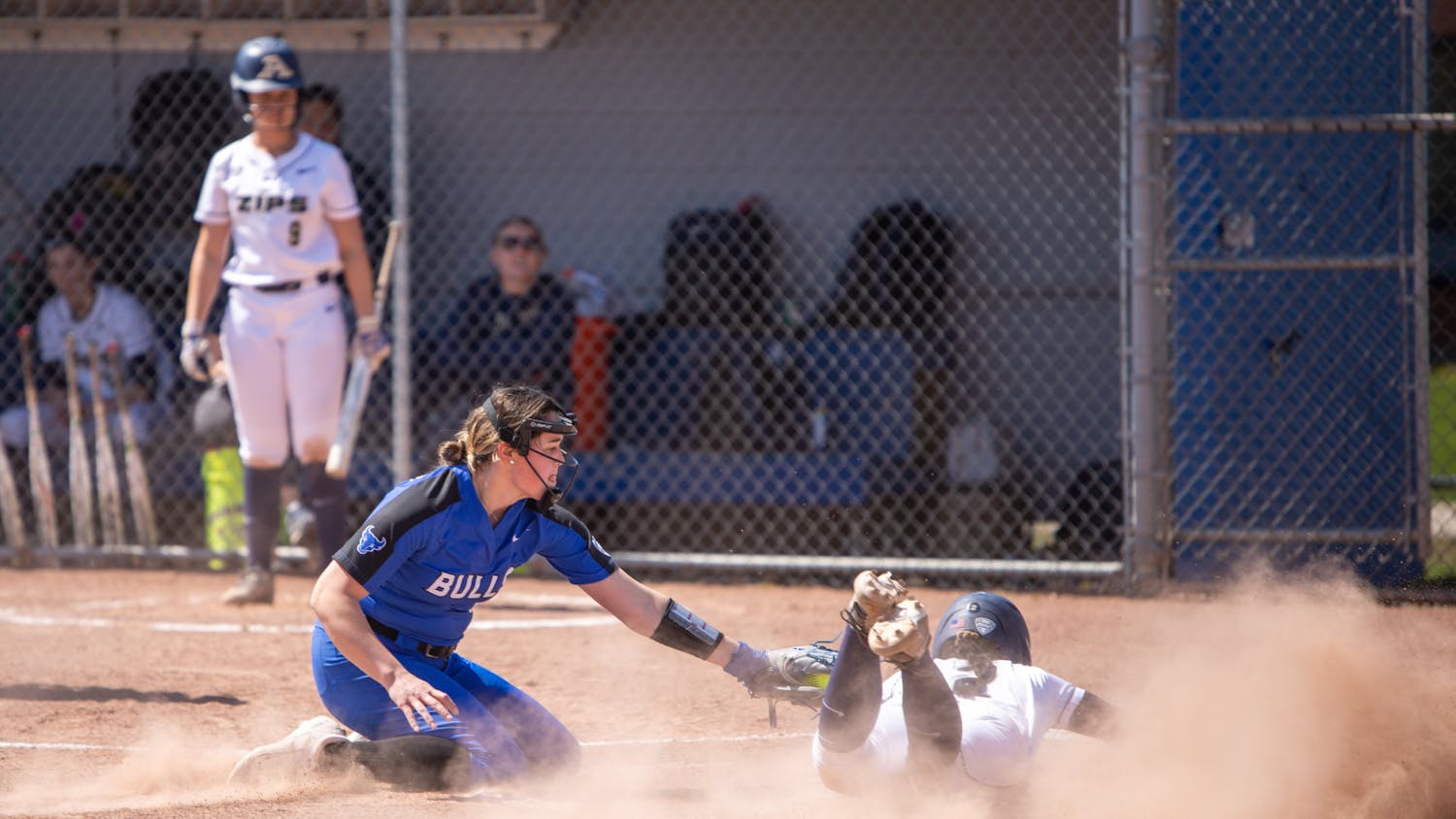Zaw Oo Ko is afraid he won’t be able to leave Burma* to attend classes at UB next fall due to a year-long state of emergency imposed by the military.
Lin Thura** almost couldn’t make his March tuition payment because banks in his home country suddenly closed, rendering his credit and debit cards useless.
Dara Cho wants to visit her family but fears she won’t be able to get a new passport visa if she leaves the U.S. at the end of the spring semester.
“Every day we’ve got something new,” Dara Cho, a senior biomedical sciences major, said. “I don’t even want to look at the news anymore because there’s something new every day.”
Burmese students at UB and across Western New York have been reeling since the Feb. 1 military coup that toppled their democratically elected government. The coup followed a landslide victory for the National League for Democracy (NLD), the party of Aung San Suu Kyi. The military*** and the opposition party they support, the Union Solidarity and Development Party, have alleged, with little evidence, that the results were fraudulent.
“There were a lot of emotions,” Zaw Oo Ko, a freshman engineering physics major, said. “Surprise, anger, disgust. Mostly disgust. I couldn’t believe they’d be low enough to do this.”
Burmese citizens have taken to the streets in daily protests and have been banging pots and pans at home in the evening. Many teachers, civil servants and other government workers have joined a Civil Disobedience Movement (CDM) and pledged not to go to work until the democratically elected government is restored.
But the military has cracked down hard. As of Tuesday, the military has killed at least 149 protestors and arrested more than 2,150, according to the Assistance Association for Political Prisoners. Forty four were killed on Sunday alone.
UB has 11 international students from Burma, two of whom are studying in Buffalo this semester.
The Buffalo area is home to approximately 8,000-10,000 Burmese immigrants, many of whom arrived in the past 20 years as refugees or asylum seekers. These immigrants have reversed Buffalo’s population decline and launched many of the city’s 15 Burmese restaurants, among other small businesses.
And members of Buffalo’s Burmese community have been doing everything in their power to return Burma to democratic rule.
Weekly demonstrations in Buffalo’s Elmwood Village neighborhood have drawn upwards of 200 protesters, according to Zaw Win, a former military political prisoner, refugee and co-founder of the WASH Project, a Burmese community center and laundromat in Buffalo. Zaw Win and other Burmese Buffalonians have also protested the coup in front of the White House, the Burmese and Chinese embassies in Washington D.C. and the United Nations headquarters.
“I would like to invite [UB students] to come and join,” he said. “Together, we can fight together, fight for all. We stand together, we show our power.”
Zaw Win has also raised thousands of dollars from Burmese community members for CDM participants who are out of a paycheck, although he has found it logistically challenging to send them the money.
While he regularly attends protests with Zaw Win, Zayar Swe, a former military political prisoner, refugee and Burmese community leader, has been finding other ways to help return Burma to a democracy. He created a petition on Change.org, calling for the deployment of U.N. peacekeeping troops to end the coup and prevent further human rights abuses. The petition has garnered over 716 signatures as of Tuesday night. Some of these signatures came from Burmese citizens, who received phone instructions from Zayar Zwe.
“The military isn’t afraid [of] anything,” Zayar Swe said. “You can sanction them, [do] whatever you want. The military doesn’t care… That’s why I’m thinking only U.N. peacekeepers can intervene and protect the people… People in Burma are dying without protection. This is the U.N.’s job, the U.N.’s responsibility to protect ordinary people, to protect human life, to prevent crime[s] against humanity.”

The Biden administration has imposed sanctions on 10 individuals and three companies affiliated with the military and blocked their access to approximately $1 billion in Burmese government funds held in the U.S., according to a statement from White House Press Secretary Jen Psaki.
Zayar Swe and other activists have also sent letters to Congress to recognize the Committee Representing Pyidaungsu Hluttaw (CRPH), a body founded by and representing elected members of Burma’s legislature who managed to escape arrest, as the official Burmese government instead of the military.
In his eyes, the more letters the better.
“If I send one letter, nobody [will] care,” Zayar Swe said. “If you send 100,000 letters, they cannot throw [them] out anymore. We have to do it together. We have to make one voice all together at the same time to be heard.”
But while Zaw Win and Zayar Swe immediately started advocating for an end to the coup, Burmese students at UB found out about the coup through their families.
Lin Thura, a sophomore biomedical sciences major, was alerted to the takeover when he tried calling his parents.
“I tried calling them on my cell phone, and it didn’t work,” Lin Thura said. “It always works, ...so I was very worried. I looked it up, and I realized that there was a coup going on in our country.”
Dara Cho’s mother was the first to warn her about the coup.
“There wasn’t any news out yet because it was too early,” Dara Cho said. “I don't know where her friend got the news from. ...When the news finally popped up, I was like, ‘Oh s—. We’re in big trouble.’”
With phone lines and the internet shutting down, Dara Cho tried contacting her parents however she could. She called her parents through an app, paying by the minute, and talked with her dad via a signal he picked up near the Thai border.
But while Dara Cho can still reach her parents, she’s worried that she won’t be able to see them in person so long as the military remains in power. Her F1 visa lasts until 2024, but her passport visa only lasts for one year. If she returns to Burma for a visit, she’d have to get a new passport visa from the military regime in order to return to the U.S. to attend grad school.
“I don’t have any intentions of living in Myanmar,” she said. “After all the education [I’ve received] here, I don’t think there’s any way I will be able to use my major there. I mean, it is really underdeveloped compared to neighboring countries. …But I would like to visit because all my family are there. ...I really wanted to go back even for a break, but right now, …[if] I go back I might not be able to come back here.”
Zaw Oo Ko lost contact with his father, who lives in New York City, for two days when the military temporarily shut down the internet.
“I felt quite powerless and scared,” Zaw Oo Ko said. “The internet’s the only thing that’s actually connecting us to the outside world. I feel like it was [like] North Korea. They could be shooting us in the streets, [and] nobody could do anything about it.”
Shunlei Win, a freshman biological sciences major who moved with her parents to New York at the age of nine, first learned about the coup from social media during a family dinner.
“I’ve heard about coups, so obviously I knew it was bad,” Win said. “But what really made me alarmed was [when] my mom was really stressed. She was so anxious, and she was trying to call her family immediately. That really scared me.”
Win and her family have battled internet and phone outages to keep in contact with their family members: an uncle participating in the CDM and two cousins who, despite their opposition to the coup, work for the military, including one who has been on the front lines.
But Win doesn’t cherish her relative safety in America. She often feels guilty about it.
“Here life just goes on. I still attend classes, ...I can still laugh and have fun with my friends,” she said. “It’s always in the back of my head but like, it’s easy to ignore it if I wanted to. And I guess that’s what makes me feel guilty.”
Nevertheless, it’s a position Zaw Oo Ko wants to be in. Badly.
“I really want to stay in the U.S.,” Zaw Oo Ko said. “The United States, for me, encompasses a lot of things we don’t have here, like freedom, liberty. You might see [your country] as a mess given what’s [been] going on in your country lately, but it’s a lot better than what we have here.”
As difficult as it is to get cut off from their families, the coup is making it harder for many Burmese UB students to go to school.
“I had difficulty paying my tuition bills because they silently closed all the banks,” Lin Thura said. “Basically my credit and debit card [that were] issued from a Burmese bank were not working for a period of time.”
Lin Thura and his family have since moved their accounts to Singapore, where some of his family lives. He isn’t worried about making future tuition payments, but he cautions that someBurmese students may struggle because not everyone has the same international “support structure” that he does.
Dara Cho considers herself “lucky” because she got her tuition payment in before the coup.
“The banks are literally closed down every day,” she said. “And then... people cannot get money out of [the] ATMs. It’s a mess.”
Dara Cho’s financial worries sadly aren’t over. Her family’s photography and printing business had already taken a hit from the pandemic; the coup has made things even worse.
“It’s pretty much no income every day,” she said.
UB says it offers programs to help international students financially affected by the coup, but that nobody has reached out for assistance.
“ISS has reached out to UB’s 11 students from Burma, two of whom are in Buffalo, to check on their wellbeing and to make them aware of emergency fund opportunities, should they need financial assistance,” a spokesperson for UB International Student Services said. “Currently, we are not aware that any of our Burmese students have requested financial assistance. Based on past precedent, UB may authorize deferment of students’ financial liability for the semester if there is great need.”

Zaw Oo Ko says he isn’t worried about being able to pay. Rather, he’s worried about being able to attend at all. When the military took over, it instituted a year-long state of emergency that may make it difficult for him to leave the country. All flights out of Burma’s main international airport have been grounded until at least April 30.
“I don’t think I could attend UB for the next three years online. It’s been really hard for me, so I must find a way to get out of the country,” he said. “There are ways. There are ways to get out of this country, and I might get desperate, and I might use these ways. Or else my life’s just going to be wasted here, so I’ve got to take the chance.”
Even in the short term, Zaw Oo Ko has found it difficult to focus on his studies.
“The news is just going off, like, every five minutes,” he said. “I couldn't really study because every five minutes I just grabbed my phone to see what’s happening, if my friend’s okay and if they said anything. ...I wake up in the middle of the night sometimes, thinking about it.”
Even halfway around the world, Win has found it difficult to focus too.
“Now I’m kind of okay. I’ve been talking to my parents, and they just told me to like to focus on whatever is going on here,” she said. “But when it first happened, I was having trouble focusing [on] school because every time I would try to work, I would just be back on Twitter, trying to read more about it and read more news articles instead of actually focusing on work.”
For most Burmese, though, democracy is about more than protection from the military. Democratic rule in Burma has improved their lives and those of their families, they say.
“I just grew up, and things just got better,” Dara Cho said.
She remembers the pickup trucks used for public transportation being replaced with air-conditioned buses, SIM cards and WiFi becoming available to regular people, commercial flights becoming widely available, the roads getting smoother and straighter.
“At first people were like not agreeing with it, but then they eventually [figured out] that it’s way better,” Dara Cho said. “We got air-conditioned buses. Who wouldn't like it?”
Not all of those benefits have been equally distributed, according to Lin Thura, who is of Chinese descent. Having experienced discrimination and sinophobic politicians under democratic rule and the military’s hostile attitude towards ethnic minorities, he was indifferent about the coup.
“The military government, the NLD government, all of them are advocating for Bamars’” — ethnic Burmese people — “rights. They’re not really focusing on us as a people,” he said. “The official title of Burma is the Republic of the Union of Myanmar, but... it’s not really a union because even though [minorities’] lands are part of the country, they’re not really considered equal citizens to the Bamar.”
Lin Thura says is more concerned about the pandemic than the military takeover, especially since many medical workers have joined the CDM.
“Right now, people are out on the street, and before you know it, the whole country will be infected,” he said.
Zaw Win says it’s “true” that ethnic minorities in Burma don’t have the same rights as ethnically Bamar people, but he doesn’t think the military will guarantee them equality either.
“I am [ethnically] Burmese,” Zaw Win said. “But our common enemy is the military.”
For most Burmese students, striking a balance between taking on their “common enemy” and their own personal safety has been difficult.
“I just told my family, ‘Don’t go out at all,’” Dara Cho said. “‘Especially to protesting places because it’'s getting intense.’”
Zaw Oo Ko has wanted to protest the coup, but since his town is divided by a river with only one bridge, he’s afraid of being trapped by police on the wrong side of town.
“If I lived in Yangon” — Burma’s largest city — “I’d probably go to protest every now and then,” he said.
But despite all the hardship, Zaw Win wants Burmese students to know that Buffalo’s Burmese community has their back.
“Right now, it’s very difficult to connect [Burmese students] with their parents,” Zaw Win said. “We are here. [We are] a strong community, the Burmese community in Buffalo. Students from UB, whatever [you] need, we have. Let us know. We can help.”
*Also known as Myanmar
**Pseudonym; Lin Thura feared military retaliation against his family and has opinions regarding Aung San Suu Kyi and her party unpopular with many Burmese UB students.
***Also known as the Tatmadaw
Grant Ashley is an assistant features editor and can be reached at grant.ashley@ubspectrum.com

Grant Ashley is the editor in chief of The Spectrum. He's also reported for NPR, WBFO, WIVB and The Buffalo News. He enjoys taking long bike rides, baking with his parents’ ingredients and recreating Bob Ross paintings in crayon. He can be found on the platform formerly known as Twitter at @Grantrashley.





